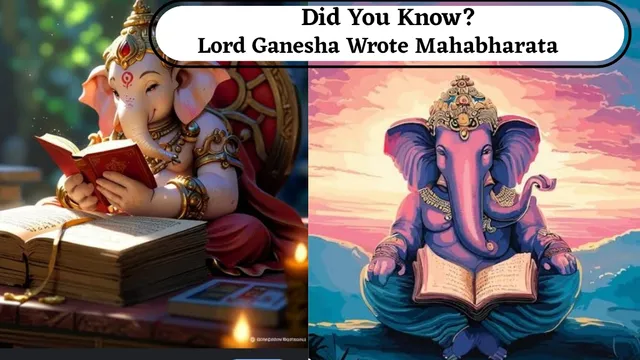- By Aditi Priya Singh
- Thu, 28 Aug 2025 05:44 PM (IST)
- Source:JND
Who Wrote Mahabharata: Indian mythology is filled with fascinating stories that have profound significance. People of all ages continue to enjoy these stories, which have been passed down through the generations. In addition to being stories about gods and goddesses, they also teach us the value of cooperation, wisdom, knowledge and discipline. The way these tales describe the beginnings of great literary and philosophical works is among their most intriguing features.
The ancient epics are not just than just books; they are priceless collections of morals, life lessons and guidance that still motivate people today. However, when reading these epics, we frequently wonder how such vast and intricate works were produced during a period before the invention of modern writing instruments. Each epic has a backstory of perseverance, hard work and divine direction.
One of these is a special story about the Mahabharata that tells the origin of one of the most important books in Indian history. When we talk about who wrote the Mahabharata, sage Ved Vyasa is considered but did you know actually the Mahabharata script was actually written by Lord Ganesha?
The Background of the Mahabharata
One of India's greatest epics, the Mahabharata, tells stories of wisdom, dharma (righteousness) and war. The sage Ved Vyasa composed it with the intention of preserving this ageless knowledge for upcoming generations. But someone extraordinary was needed to write down such a vast and intricate epic.
ALSO READ: Why You Should Not Keep More Than One Photo Or Idol Of Lord Ganesha At Home? Vastu Shastra Explains
Why Lord Ganesha Was Chosen?
-1756382991519.jpg) Who wrote the Mahabharata (Image: Freepik)
Who wrote the Mahabharata (Image: Freepik)
According to legends, Ved Vyasa needed someone who could write without pausing and comprehend the meaning behind what he was saying. For this divine mission, Lord Ganesha was selected, who is also known as the God of Wisdom and Knowledge. His sharp intellect and unmatched patience made him the perfect scribe.
The Unique Condition Set by Ganesha
It is said that Ganesha agreed to write, but on one strict condition: Vyasa had to recite the verses continuously. Ganesha would abandon the task if Vyasa ever stopped or disrupted the flow. This requirement guaranteed the narration's concentration, order and coherence.
Vyasa’s Clever Counter-Condition
Equally wise, Vyasa implemented his own rule: Ganesha must never compose a verse before thoroughly comprehending it. This allowed Vyasa brief respites whenever Ganesha stopped to consider the deeper significance. As a result, the process balanced patience and intelligence.
The Writing of the Mahabharata
Following this arrangement, Ganesha started writing and Vyasa started dictating. It is said that this writing went on uninterrupted for days and nights. As a result, the Mahabharata became the longest epic ever written, with over 100,000 verses.
A Lesson from the Tale
The story is more than just mythology; it teaches values like:
* Discipline – Ganesha’s commitment to write without pause.
* Wisdom – Vyasa’s cleverness to balance the task.
* Patience – The time and effort it took to complete the epic.
* Collaboration – Great achievements happen when wisdom and intellect come together.
ALSO READ: Why Does Lord Ganesha Kept For 3, 5, 7 Or 10 Days? Ganesh Chaturthi Traditions Explained
This little-known story about how the Mahabharata was written emphasises the balance between human wisdom and divine power. It serves as a reminder that perseverance, commitment, and teamwork are the foundations of even the greatest historical works. Beyond the Mahabharata's conflicts and lessons, the narrative of its composition serves as a lesson in mutual respect and cooperation. It demonstrates that knowledge can endure forever if it is handled carefully.

